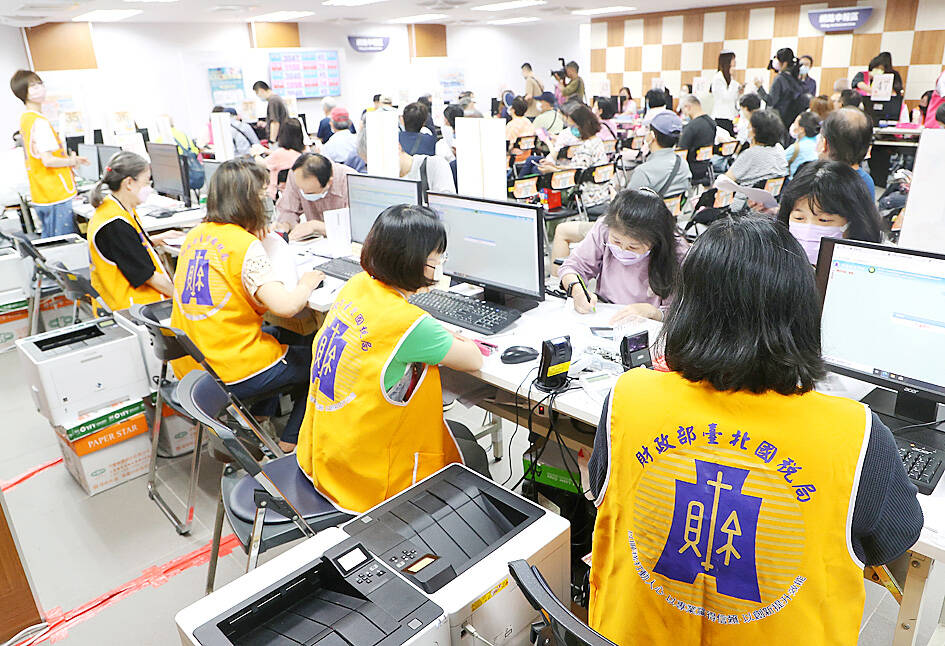The government last month received NT$159 billion (US$4.91 billion) in tax revenue, a 21 percent increase from a year earlier, thanks mainly to stock and property transactions, the Ministry of Finance said on Friday.
Tax revenue from securities transactions spiked more than twofold to NT$25.8 billion, as daily turnover last month soared 76 percent year-on-year to NT$467.5 billion, the ministry’s monthly report showed.
“Last month saw the TAIEX going through wild ups and downs linked to an ongoing AI [artificial intelligence] frenzy and Taiwan Semiconductor Manufacturing Co’s [TSMC, 台積電] conservative outlook about peers,” ministry statistics official Liu Shun-rong (劉訓蓉) told an online news conference.

Photo: CNA
As a result, the local exchange shed more than 1,000 points after TSMC’s earnings guidance, but staged rapid rebounds days later, Liu said, adding that investors by and large remain positive about the business opportunities fast-growing AI applications would bring, Liu said.
Taiwan is home to the world’s major suppliers of advanced chips, high-end servers, storage, and memory devices used in AI infrastructure and solutions.
At the same time, tax revenue from land value gains rose 44.2 percent to NT$7.5 billion on the back of property transactions, Liu said.
Property deals in the nation’s six special municipalities soared 43 percent year-on-year to 22,900 units last month, supported by a government interest subsidy and other favorable lending terms for first-home purchases.
However, the property market could slow a bit moving forward, as the low base effect would increasingly fade away and the central bank’s interest rate hike in March would help rein in buying interest, Liu said.
Cumulative tax revenues in the first four months of the year totaled NT$716.5 billion, suggesting a 15.8 percent pickup from the same time last year and exceeding the government’s target by 15.7 percent, the ministry said.

NEW IDENTITY: Known for its software, India has expanded into hardware, with its semiconductor industry growing from US$38bn in 2023 to US$45bn to US$50bn India on Saturday inaugurated its first semiconductor assembly and test facility, a milestone in the government’s push to reduce dependence on foreign chipmakers and stake a claim in a sector dominated by China. Indian Prime Minister Narendra Modi opened US firm Micron Technology Inc’s semiconductor assembly, test and packaging unit in his home state of Gujarat, hailing the “dawn of a new era” for India’s technology ambitions. “When young Indians look back in the future, they will see this decade as the turning point in our tech future,” Modi told the event, which was broadcast on his YouTube channel. The plant would convert

‘SEISMIC SHIFT’: The researcher forecast there would be about 1.1 billion mobile shipments this year, down from 1.26 billion the prior year and erasing years of gains The global smartphone market is expected to contract 12.9 percent this year due to the unprecedented memorychip shortage, marking “a crisis like no other,” researcher International Data Corp (IDC) said. The new forecast, a dramatic revision down from earlier estimates, gives the latest accounting of the ongoing memory crunch that is affecting every corner of the electronics industry. The demand for advanced memory to power artificial intelligence (AI) tasks has drained global supply until well into next year and jeopardizes the business model of many smartphone makers. IDC forecast about 1.1 billion mobile shipments this year, down from 1.26 billion the prior

People stand in a Pokemon store in Tokyo on Thursday. One of the world highest-grossing franchises is celebrated its 30th anniversary yesterday.

Zimbabwe’s ban on raw lithium exports is forcing Chinese miners to rethink their strategy, speeding up plans to process the metal locally instead of shipping it to China’s vast rechargeable battery industry. The country is Africa’s largest lithium producer and has one of the world’s largest reserves, according to the US Geological Survey (USGS). Zimbabwe already banned the export of lithium ore in 2022 and last year announced it would halt exports of lithium concentrates from January next year. However, on Wednesday it imposed the ban with immediate effect, leaving unclear what the lithium mining sector would do in the